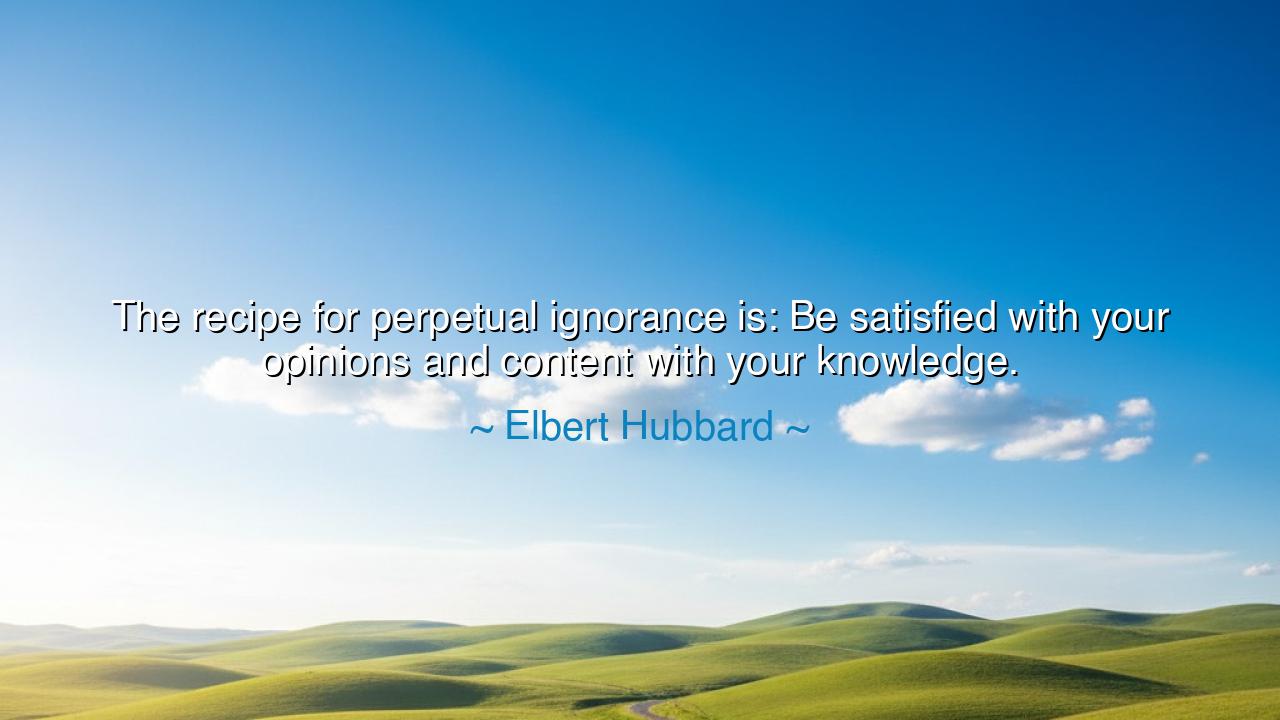
The recipe for perpetual ignorance is: Be satisfied with your
The recipe for perpetual ignorance is: Be satisfied with your opinions and content with your knowledge.






Hear the piercing words of Elbert Hubbard, the fiery craftsman of thought, who declared: “The recipe for perpetual ignorance is: Be satisfied with your opinions and content with your knowledge.” This utterance is both warning and prophecy, for it unmasks the hidden enemy of the human spirit: complacency. To be satisfied with one’s opinions is to build a prison of pride. To be content with one’s knowledge is to refuse the endless banquet of wisdom spread before us by time, nature, and experience. Hubbard reveals that ignorance is not merely the absence of learning, but the death of the desire to learn.
In these words, Hubbard speaks with the voice of the ancients. For all true teachers have said that wisdom begins with humility. Socrates confessed that he knew nothing, and in this confession lay the greatness of his mind. By contrast, those who imagine themselves already wise close the door to discovery. When a man believes his opinions to be final truth, he becomes deaf to reason, blind to evidence, and unmoved by experience. Thus, he falls into perpetual ignorance, a stagnation worse than simple unknowing, for it is chosen and defended with pride.
History offers us many examples of this peril. Recall the leaders of the medieval church who clung to the belief that the earth was fixed and the heavens revolved around it. Their opinions were treated as divine law, and their knowledge declared complete. Yet when Galileo raised his telescope to the stars, he saw truth with his own eyes. Instead of listening, they silenced him, preferring their stagnant certainty over living inquiry. Their satisfaction with their own knowledge delayed progress for generations and darkened the human path.
On the other hand, the story of Charles Darwin shines with the opposite lesson. Though his discoveries shook the foundation of belief, he did not cling blindly to inherited opinions. He doubted, questioned, tested, and endured opposition. His refusal to be content with what was already “known” opened new fields of understanding and transformed science forever. In his example we see that true greatness comes not from defending old opinions, but from daring to seek beyond them.
Hubbard’s teaching is also a call to self-examination. How often do we cling to our opinions as though they were shields of identity? How often do we protect our small store of knowledge instead of enlarging it? To be human is to be limited, but to remain willingly limited is to betray the gift of the mind. Complacency is the bed where the spirit falls asleep, while humility and curiosity are the wings that lift it ever higher.
The lesson is clear: never grow content with what you know, never worship your own opinions. Instead, question yourself as fiercely as you question others. Seek out those who think differently, and listen to them. Read deeply, learn widely, and allow your knowledge to grow like a living tree, never finished, always reaching toward the sun. In this way, ignorance will not chain you, and wisdom will always find you awake and ready.
So I say to you: be restless in learning, and be humble in judgment. Let curiosity be your constant companion, and let humility guard your heart against pride. For as Hubbard declared, the recipe for perpetual ignorance is satisfaction with your own mind. Break this recipe, and instead hunger always for more truth, more understanding, more light.
Thus his words endure as a torch for all who seek: ignorance is not the absence of knowledge, but the arrogance of believing you have enough. Only the humble, only the seekers, will walk the endless path of wisdom.






AAdministratorAdministrator
Welcome, honored guests. Please leave a comment, we will respond soon